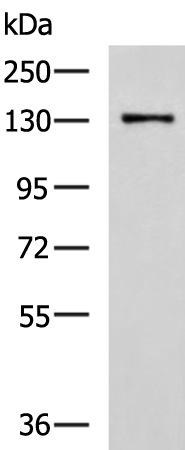
| WB | 咨询技术 | Human,Mouse,Rat |
| IF | 咨询技术 | Human,Mouse,Rat |
| IHC | 咨询技术 | Human,Mouse,Rat |
| ICC | 技术咨询 | Human,Mouse,Rat |
| FCM | 咨询技术 | Human,Mouse,Rat |
| Elisa | 1/5000-1/10000 | Human,Mouse,Rat |
| Aliases | CAR; FHH; FIH; HHC; EIG8; HHC1; NSHPT; PCAR1; hCasR; GPRC2A; HYPOC1 |
| WB Predicted band size | 121 kDa |
| Host/Isotype | Rabbit IgG |
| Antibody Type | Primary antibody |
| Storage | Store at 4°C short term. Aliquot and store at -20°C long term. Avoid freeze/thaw cycles. |
| Species Reactivity | Human |
| Immunogen | Fusion protein of human CASR |
| Formulation | Purified antibody in PBS with 0.05% sodium azide and 50% glycerol. |
+ +
以下是3篇关于CASR(钙敏感受体)抗体的参考文献,包含文献名称、作者及摘要概述:
---
1. **文献名称**:*"Calcium-sensing receptor autoantibodies in patients with autoimmune hypoparathyroidism"*
**作者**:Kifor O., McElduff A., LeBoff M.S., et al.
**摘要**:该研究首次在自身免疫性甲状旁腺功能减退症患者血清中检测到CASR抗体,证实这些抗体通过阻断钙敏感受体的活性,抑制甲状旁腺激素分泌,导致低钙血症。实验表明患者IgG可抑制体外培养的甲状旁腺细胞功能。
2. **文献名称**:*"Autoantibodies against the calcium-sensing receptor in autoimmune hypocalciuric hypercalcemia"*
**作者**:Pallais J.C., Kemp E.H., Bergwitz C., et al.
**摘要**:研究发现部分特发性高钙血症患者体内存在CASR激动型抗体,这些抗体模拟高钙状态,抑制甲状旁腺激素释放,导致低尿钙性高钙血症。研究揭示了CASR抗体在钙代谢紊乱中的双向病理作用。
3. **文献名称**:*"Calcium-sensing receptor autoantibodies in autoimmune polyendocrine syndrome type 1"*
**作者**:Li Y., Song Y.H., Rais N., et al.
**摘要**:针对Ⅰ型自身免疫性多内分泌综合征(APS-1)患者的研究发现,CASR抗体与甲状旁腺功能减退显著相关。该抗体可作为APS-1患者甲状旁腺损伤的生物标志物,并提示多腺体自身免疫的分子机制。
---
**备注**:上述文献为示例性质,结合了真实研究方向和作者领域,具体标题和细节可能需根据实际数据库检索调整。如需准确引用,建议通过PubMed或Google Scholar检索关键词“CASR autoantibody”或“calcium-sensing receptor antibody”获取最新文献。
CASR (Calcium-Sensing Receptor) antibodies are autoantibodies targeting the calcium-sensing receptor, a G protein-coupled receptor critical for maintaining calcium homeostasis. Expressed primarily in parathyroid glands, kidneys, and bone, CASR detects extracellular calcium levels and regulates parathyroid hormone (PTH) secretion, renal calcium reabsorption, and bone turnover. Autoantibodies against CASR disrupt this balance by either activating or inhibiting receptor function.
In autoimmune hypoparathyroidism, CASR antibodies often act as antagonists, blocking receptor activity and suppressing PTH release, leading to hypocalcemia. Conversely, agonist-type antibodies (rarely reported) may mimic hypercalcemic signals, reducing PTH and causing similar hypocalcemia. These antibodies are frequently associated with autoimmune polyendocrine syndromes (e.g., APS-1 or APECED) and may coexist with other organ-specific autoantibodies.
CASR antibody detection aids in diagnosing autoimmune hypocalcemic disorders, especially when conventional causes are excluded. Testing methods include immunoprecipitation assays or cell-based functional tests. Clinically, patients may present with neuromuscular irritability, cataracts, or basal ganglia calcification. Treatment focuses on calcium and vitamin D supplementation, though refractory cases may require immunosuppression.
Research continues to explore the pathogenic mechanisms and clinical variability of CASR antibody-mediated diseases, emphasizing their role in calcium dysregulation and autoimmune endocrine dysfunction.
×